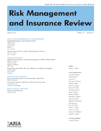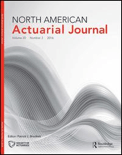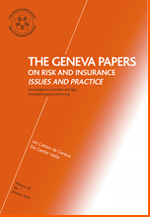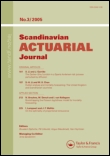
RISK MANAGEMENT AND INSURANCE REVIEW
Scope & Guideline
Empowering Practitioners with Cutting-Edge Risk Insights
Introduction
Aims and Scopes
- Risk Assessment and Management:
The journal emphasizes methodologies and frameworks for assessing and managing various types of risks, including financial, operational, and environmental risks. This includes empirical studies that evaluate risk management strategies and their effectiveness. - Insurance Market Analysis:
A core focus is on analyzing insurance markets, including trends, competition, and regulatory impacts. Research often examines how market dynamics influence pricing, coverage, and consumer behavior. - Behavioral Economics in Insurance:
The journal explores the intersection of behavioral economics and insurance, investigating how psychological factors affect decision-making in risk and insurance contexts. - Technological Innovations in Insurance:
With the rise of InsurTech, the journal covers technological advancements and their implications for insurance products, services, and operational efficiency. - Corporate Social Responsibility in Insurance:
Research on the role of corporate social responsibility (CSR) within the insurance industry is highlighted, particularly how CSR practices impact consumer trust and company performance. - Climate and Environmental Risk:
The journal addresses the growing importance of climate-related risks and their implications for insurance coverage, underwriting practices, and policy development.
Trending and Emerging
- Impact of COVID-19 on Insurance Practices:
Research examining the implications of the COVID-19 pandemic on various aspects of insurance, including claims, pricing, and market dynamics, has surged, illustrating the need for adaptive strategies in crisis management. - Cyber Insurance and Risk Management:
As cyber threats grow, there is an increasing focus on cyber insurance, its efficacy, and the strategies organizations employ to mitigate cyber risks, reflecting a critical area of concern for businesses. - Sustainability and Climate Risk Management:
The integration of sustainability practices and the management of climate-related risks within insurance frameworks is emerging as a prominent research area, driven by regulatory pressures and societal expectations. - InsurTech Innovations:
The rise of InsurTech continues to be a hot topic, with research focused on how technology is transforming the insurance landscape, including new business models, data analytics, and customer engagement strategies. - Behavioral Insights in Insurance Decisions:
There is a growing trend towards incorporating behavioral insights into understanding consumer decisions regarding insurance products, highlighting the importance of psychological factors in risk management.
Declining or Waning
- Traditional Risk Models:
There has been a noticeable decline in research focused solely on traditional risk modeling techniques, with a shift towards more dynamic and complex models that incorporate behavioral and technological factors. - General Insurance Marketing Strategies:
While marketing remains relevant, specific studies on general insurance marketing strategies have decreased, possibly as researchers pivot to more innovative and data-driven approaches in the marketing domain. - Historical Analysis of Insurance Markets:
The frequency of historical analyses of insurance markets has waned, as contemporary market dynamics and real-time data gain precedence in research discussions. - Regional Studies in Isolation:
Research focused solely on regional insurance markets without a comparative or global perspective has declined, reflecting a trend towards more integrative analyses that consider global implications. - Static Risk Assessment Tools:
The use of static tools for risk assessment is declining, as the field increasingly adopts dynamic models that account for real-time data and evolving risk landscapes.
Similar Journals

Geneva Risk and Insurance Review
Advancing knowledge in risk and insurance dynamics.Geneva Risk and Insurance Review, published by Palgrave Macmillan Ltd, stands as a premier academic journal dedicated to advancing the understanding of risk and insurance through rigorous research and analysis. With an ISSN of 1554-964X and an E-ISSN of 1554-9658, this journal has carved out a notable niche in the fields of Accounting, Business Management, and Finance, as reflected by its 2023 category quartiles and Scopus rankings, positioning it among the top echelons of scholarly output in these disciplines. The journal is renowned for its commitment to open access, enhancing accessibility for a diverse audience of researchers, professionals, and students keen to explore the complexities of risk dynamics. Since its inception in the mid-1970s, and with recent converged years leading up to 2024, it has consistently provided a platform for groundbreaking studies that shape policies and practices in the insurance sector. The journal's reputation for excellence and influential contributions makes it an essential resource for those engaged in the evolving discussions surrounding risk management and insurance strategies.

North American Actuarial Journal
Transforming Data into Actionable Insights for ActuariesNorth American Actuarial Journal is a prominent publication in the fields of Economics and Econometrics, Statistics and Probability, and Statistics, Probability and Uncertainty, published by Routledge Journals, Taylor & Francis Ltd. The journal, with the ISSN 1092-0277 and E-ISSN 2325-0453, covers critical advancements in actuarial science over the years from 1997 to 2024. With a strong Q2 ranking in multiple categories for 2023, the journal positions itself as a vital resource for researchers and practitioners looking to stay abreast of current trends and methodologies in actuarial practices. The journal’s focus on providing a platform for high-quality research makes it indispensable for professionals and academics alike, offering insightful contributions that influence the actuarial field's evolution. While it currently does not offer open access options, its rigorous peer-review process ensures the integrity and relevance of its published works. Researchers, professionals, and students in actuarial science will find this journal to be a valuable asset for both their studies and professional development.

GENEVA PAPERS ON RISK AND INSURANCE-ISSUES AND PRACTICE
Transforming Insights into Actionable Insurance StrategiesGENEVA PAPERS ON RISK AND INSURANCE-ISSUES AND PRACTICE is a leading academic journal dedicated to advancing the fields of risk management and insurance, published by the esteemed Palgrave Macmillan Ltd. With an ISSN of 1018-5895 and an E-ISSN of 1468-0440, this journal serves as a pivotal platform for sharing cutting-edge research and practical insights addressing a diverse range of issues within the insurance sector. Established in 1999, it spans a wide array of topics, including risk assessment, financial implications, and policy development, contributing to its recognition in the Q2 quartile across multiple categories such as Accounting and Economics. With a notable Scopus ranking reflecting its relevance—ranked #229/716 in Economics and Econometrics, and #106/317 in Finance—it provides invaluable resources for scholars, professionals, and policymakers alike. Despite being a non-open-access journal, the GENEVA PAPERS ensures a rigorous peer-review process, aiming to uphold the highest standards of scholarly publication. Whether you are a researcher looking to publish groundbreaking studies or a practitioner seeking the latest trends and analyses in the insurance landscape, this journal stands out as an essential resource in the domain.

Journal of Insurance Issues
Advancing Knowledge in Insurance PracticesJournal of Insurance Issues, published by the Western Risk & Insurance Association, stands as a pivotal platform for the exploration and dissemination of knowledge in the field of insurance and risk management. With an ISSN of 1531-6076 and an E-ISSN of 2332-4244, this journal delves into the complexities and evolving dynamics of insurance practices, policies, and theoretical underpinnings. Although not an open-access journal, it remains accessible to a broad audience, including academics, practitioners, and students eager to engage with rigorous research and innovative ideas. The journal is dedicated to enhancing understanding in critical areas such as risk assessment, regulatory impacts, insurance economics, and consumer behavior, thereby contributing significantly to the professional discourse within the insurance sector. Its robust editorial standards ensure that published works meet high-quality scholarly criteria, further establishing the journal as an essential resource for anyone interested in the multifaceted world of insurance.

Anales del Instituto de Actuarios Espanoles
Fostering Excellence in Actuarial Methodologies and AnalysisAnales del Instituto de Actuarios Españoles is a prestigious journal dedicated to advancing the field of actuarial science and related disciplines. Published by the Instituto de Actuarios Españoles, this journal serves as a vital platform for researchers, practitioners, and students aiming to share innovative methodologies, comprehensive analyses, and groundbreaking research that contribute to the actuarial profession. Although not an open-access journal, its rigorous peer-review process ensures high-quality publications that have garnered respect within the academic community. With an ISSN number of 0534-3232 and an E-ISSN of 2531-2308, Anales del Instituto de Actuarios Españoles plays a crucial role in disseminating knowledge that shapes actuarial practices and policies, thereby enhancing the effectiveness of the profession in addressing contemporary challenges.

American Economic Journal-Macroeconomics
Delivering High-Impact Research in MacroeconomicsAmerican Economic Journal-Macroeconomics, published by the American Economic Association, stands at the forefront of economic research, addressing pivotal macroeconomic issues that shape global economies. With an impressive Scopus rank of #8 out of 288 in its field and a notable 97th percentile ranking, this journal is widely regarded as a top-tier publication, specifically categorized in the Q1 category for Economics, Econometrics, and Finance as of 2023. Operating under ISSN 1945-7707 and E-ISSN 1945-7715, it aims to disseminate high-quality research from 2009 through 2024 and beyond, providing crucial insights into macroeconomic theory and policy. Although the journal currently does not operate under an open access model, it remains a vital resource for researchers, economists, and students seeking to deepen their understanding of macroeconomic dynamics and their implications for economic policy worldwide. The journal's impactful contributions make it an essential read for those striving to influence economic thought and practice.

Scandinavian Actuarial Journal
Pioneering research at the intersection of economics and actuarial science.The Scandinavian Actuarial Journal, published by Taylor & Francis Ltd, stands as a pivotal resource in the fields of Economics, Econometrics, Statistics, and Probability, with a legacy dating back to 1918. This esteemed journal, headquartered in the United Kingdom, offers valuable insights and comprehensive research findings that contribute significantly to the actuarial and statistical communities. With its impressive 2023 quartile rankings—Q1 in both Statistics and Probability, and in Statistics, Probability and Uncertainty, as well as Q2 in Economics and Econometrics—this journal is recognized for its high-quality peer-reviewed content, making it indispensable for researchers, professionals, and students alike. Although it currently does not operate under an Open Access model, the journal ensures rigorous academic standards and broad visibility within its field. With a Scopus rank placing it in the top quartile of relevant categories, the Scandinavian Actuarial Journal is committed to advancing knowledge and fostering innovation in statistical methodologies and insights.

Journal of Mathematics in Industry
Fostering Collaborative Solutions with Mathematical ApplicationsJournal of Mathematics in Industry, published by Springer, stands as a pivotal platform for researchers and professionals exploring the intersection of mathematical applications and real-world industrial challenges. With an impact factor signaling its robust influence in the field, the journal has distinguished itself within the Q3 quartile of applied mathematics, ranking 95 out of 635 according to Scopus, placing it in the 85th percentile among its peers. Since its inception in 2011, the journal has embraced the Open Access model, fostering a collaborative and unrestricted dissemination of knowledge. This initiative not only enhances visibility but also encourages engagement from a global audience eager to apply mathematical innovations in various industries. As the journal looks towards the future, it continues to bridge the gap between theoretical mathematical research and practical industrial applications, making it an invaluable resource for academics, practitioners, and students alike.

Mathematics and Financial Economics
Innovating Financial Strategies through Mathematical RigorMathematics and Financial Economics, published by Springer Heidelberg, is a leading peer-reviewed journal that explores the intersections of mathematical theories and financial practices. With an ISSN of 1862-9679 and an E-ISSN of 1862-9660, the journal has made notable contributions to its field since its inception in 2007, with a convergence period extending until 2024. Positioned in the prestigious Q2 category for both Finance and Statistics and Probability, the journal is ranked within the top 66th percentile in Mathematics and Statistics and the 62nd percentile in Decision Sciences according to Scopus metrics. Researchers and professionals looking for high-quality, innovative research in mathematical finance will find valuable insights within its pages. Although primarily a subscription-based journal, it aims to foster knowledge sharing among academia and industry experts. Its commitment to advancing quantitative methods and financial applications solidifies its importance as a resource for students, researchers, and practitioners dedicated to understanding and navigating the complex dynamics of financial markets.

JOURNAL OF AGRICULTURAL AND RESOURCE ECONOMICS
Connecting scholars and practitioners in resource economics.Journal of Agricultural and Resource Economics is a pivotal platform in the realm of agricultural and resource economics, published by the Western Agricultural Economics Association. Since its inception, the journal has embraced an Open Access model, fostering widespread dissemination of research findings to benefit both scholars and practitioners in the field. The journal operates within an impressive global ranking framework, resting in Q2 across several pertinent categories including Agronomy and Crop Science, Animal Science and Zoology, and Economics and Econometrics. With its ISSN 1068-5502 and E-ISSN 2327-8285, it has garnered attention for its rigorous academic standards and impactful contributions to the discourse on resource management and agricultural practices. Researchers, professionals, and students alike will find the journal's ongoing commitment to advancing knowledge invaluable, with publications that span from 1996 to 2024 capturing evolving trends and insights in the sector.